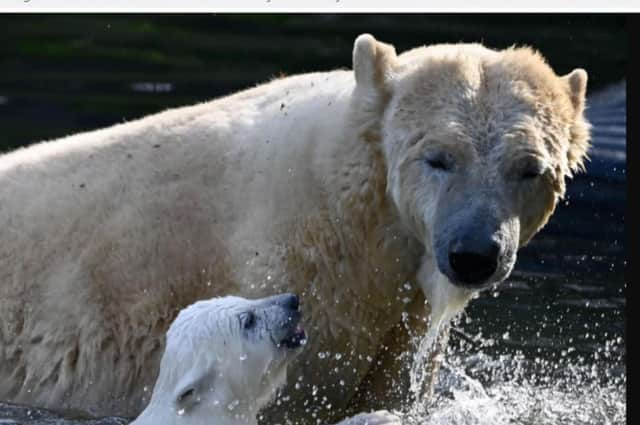Yorkshire Wildlife Park joins 'ground breaking' polar bear research


The park near Doncaster, which is home to eight bears, is participating and sponsoring the International Think Tank on Polar Bear Welfare, which will see researchers work to better understand the psychological priorities of the animals.
As part of the project, Dr Charlotte McDonald, director of animals at Yorkshire Wildlife Park, and Kim Wilkins, the park's carnivore team leader, will work alongside experts from zoos around the world and scientists, who work in the field with wild bears, as part of a virtual workshop.
Advertisement
Hide AdAdvertisement
Hide AdThey hope to make a breakthrough that will help them save the species, whose numbers are dropping alarmingly because climate change is melting their sea ice habitat.
Dr McDonald said: “Now is the time to progress our knowledge further by pulling together the expertise of the international polar bear community for one of the most ground-breaking investigations ever to be carried out on polar bear welfare that could be the significant first step to understand the welfare of both bears under human care around the world and ultimately in the wild.”
Assiniboine Park Zoo in Canada and Yorkshire Wildlife Park, the two largest polar bear facilities in the world, are supporting the project, which has also been backed by Polar Bear Horizon and an anonymous donor.
Dr Jake Veasey, of Care for the Rare, has pioneered the research and will facilitate the workshop.
Advertisement
Hide AdAdvertisement
Hide AdHe said: “The future looks increasingly bleak for polar bears and so it is clearly time to consider radical solutions.
“In the past, conservation focused on monitoring species and protecting them and the space they lived in from conventional human exploitation like habitat loss or hunting.
“This approach won’t save polar bears from the changes that are happening in the Earth’s climate.”
He added: “By inviting the world’s polar bear experts to collectively identify what is important to polar bears we can achieve three key things; firstly, we can help identify early warning systems for conservation risk factors that can inform policy without being overly dependent on proofs of population-decline which are difficult to definitively establish and by their nature are already too late.
Advertisement
Hide AdAdvertisement
Hide Ad“Secondly, we can continue to improve care in captive facilities which is likely to be increasingly important as hungry bears are forced inland and into conflict with northern communities, and finally we can begin to consider how polar bears might adapt to declining sea-ice, and crucially how we might be able to assist with that through ecosystem-based adaptation.”
